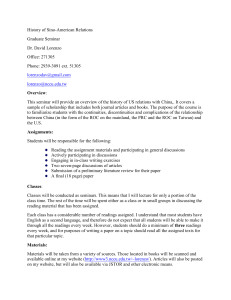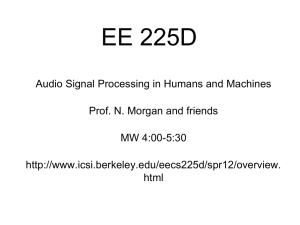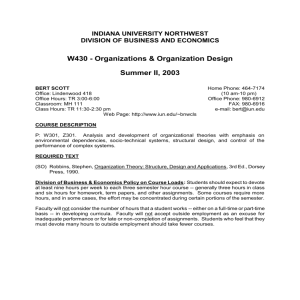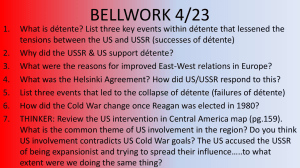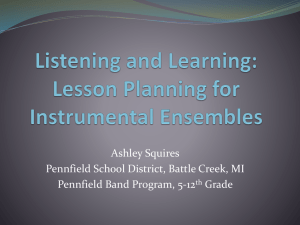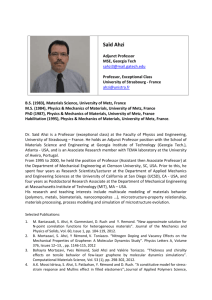a history of Sino-American relations Prologue, Chapter 1
advertisement
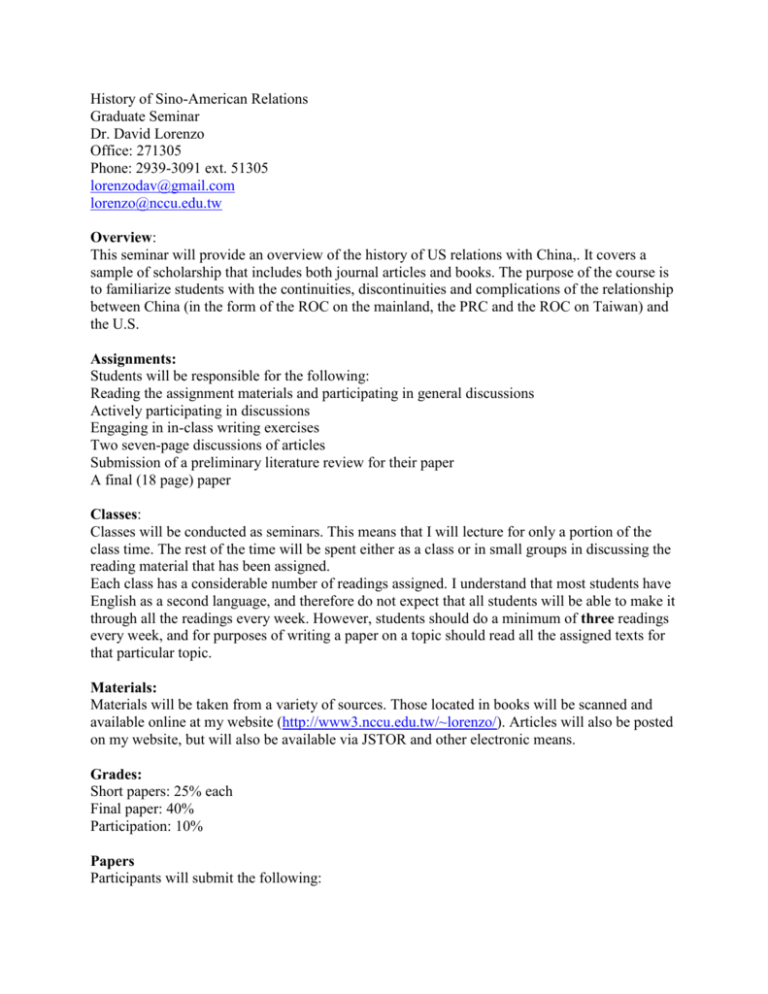
History of Sino-American Relations Graduate Seminar Dr. David Lorenzo Office: 271305 Phone: 2939-3091 ext. 51305 lorenzodav@gmail.com lorenzo@nccu.edu.tw Overview: This seminar will provide an overview of the history of US relations with China,. It covers a sample of scholarship that includes both journal articles and books. The purpose of the course is to familiarize students with the continuities, discontinuities and complications of the relationship between China (in the form of the ROC on the mainland, the PRC and the ROC on Taiwan) and the U.S. Assignments: Students will be responsible for the following: Reading the assignment materials and participating in general discussions Actively participating in discussions Engaging in in-class writing exercises Two seven-page discussions of articles Submission of a preliminary literature review for their paper A final (18 page) paper Classes: Classes will be conducted as seminars. This means that I will lecture for only a portion of the class time. The rest of the time will be spent either as a class or in small groups in discussing the reading material that has been assigned. Each class has a considerable number of readings assigned. I understand that most students have English as a second language, and therefore do not expect that all students will be able to make it through all the readings every week. However, students should do a minimum of three readings every week, and for purposes of writing a paper on a topic should read all the assigned texts for that particular topic. Materials: Materials will be taken from a variety of sources. Those located in books will be scanned and available online at my website (http://www3.nccu.edu.tw/~lorenzo/). Articles will also be posted on my website, but will also be available via JSTOR and other electronic means. Grades: Short papers: 25% each Final paper: 40% Participation: 10% Papers Participants will submit the following: History of Sino-American Relations During the classes on the 7th and 12th weeks: A seven page paper analyzing and assessing an issue surrounding a weekly topic we have covered (e.g., the attitude of the US during the Taiping uprising). These papers should clearly set out the issue, generate interesting questions regarding the issue, cover ways of thinking about that issue from a variety of perspectives grounded in scholarly sources, and discuss the implications of issue area. During the class of the 15th week: A three page review of the literature on the subject of your final paper. This review shall identify relevant articles and books, discuss their relationship with the question posed by the paper, and assess the state of the scholarship at present bearing on the question posed. Final: On the day scheduled for the final exam submit the final paper. This paper will, building upon the literature review, data, and theoretical position you build, explore a question implicated in the study of Sino-American relations. Your paper must clearly: Identify the question you pose Discuss that question in light of the literature review you create Identify the methodology and evidence you will utilize Answer the question Discuss the importance and relevance of your answer Discuss the importance and relevance of your answer both generally and in light of your literature review. Grading Scale: A: 100-90: Excellent work—generates several interesting insights and displays a sure grasp of the material B: 89-80: Good, above average work—sometimes generates interesting insights and displays a solid grasp of the material C: 79-70: Average work—displays a competent grasp of the material D: 69-60: Below average work—displays a grasp of the material that is sometimes deficient F: 59- : Unacceptable work: displays a poor grasp of the material Course Outline and Topics (subject to change) Week of Sept 17: Introduction: E. Davis, ed., Chinese Perspectives on Sino-American Relations, 1950-2000, Edwin Mellon, 2000, chaps. 1, 19. P. Saunders, "Supping with a Long Spoon: Dependence and Interdependence in SinoAmerican Relations," The China Journal, No. 43 (Jan., 2000), pp. 55-81 Week of Sept. 24: Early Relations: Cohen, America's response to China: a history of Sino-American relations Prologue, Chapter 1 K. Latourette, The History of Early Relations between the United States and China, 17841844 , chaps. III, IV and V 2 History of Sino-American Relations M. Hunt, The Making of a Special Relationship: the United States and China to 1914 (Columbia U. Press, 1983), chaps. 1 and 2 Week of Oct. 1: Late 19th Century Relations: Cohen, America's Response to China, Chapter 2 Hunt, The Making of a Special Relationship, chaps. 3, 4 and 5. M. Hunt, The Genesis of Chinese Communist Foreign Policy, chap. 2 P. Harris, “Cultural Imperialism and American Protestant Missionaries: Collaboration and Dependency in Mid-Nineteenth-Century China,” Pacific Historical Review, 60:3 (Aug 1991) Week of Oct. 8: Early 20th Century Relations Cohen, chaps. 3, 4 Hunt, The Making of a Special Relationship, chaps. 7 and 8. Hunt, The Genesis of Chinese Communist Foreign Policy, chaps. 3, 4 Jerry Israel Progressivism and the Open Door: America and China, 1905-1921, intro, chaps 1 3, 4. Noel H. Pugach, "American Friendship for China and the Shantung Question at the Washington Conference,” The Journal of American History, Vol. 64, No. 1 (Jun., 1977) Hu Sheng, Imperialism and Chinese Politics, pp. 106-175. Week of Oct. 15: Early Relations with The Republic of China William C. Kirby, "The Internationalization of China: Foreign Relations at Home and Abroad in the Republican Era". The China Quarterly, No. 150, Special Issue: Reappraising Republic China (Jun., 1997). Hunt, The Genesis of Chinese Communist Foreign Policy, chap. 4 Cohen, America's Response to China, pp. 90-134. Cohen, The Chinese Connection, pp. 71-148. Israel, Progressivism and the Open Door, chap. 7 Week of Oct. 22: Relations in the 1920s and 1930s Frank Ninkovich, "The Rockefeller Foundation, China, and Cultural Change," Journal of American History, Vol. 70, No. 4 (Mar., 1984) Hunt, The Genesis of Chinese Communist Foreign Policy, chap. 5 Cohen, America's Response to China, chap. 5. Week of Oct. 29: Relations During WWII Theodore White, ed., The Stilwell Papers Warren Cohen, The Chinese Connection, chap. 8 Barbara Tuchman, Stillwell and the American Experience in China Davis, Chinese Perspectives on Sino-American Relations, chap. 2. Cairo Conference (http://avalon.law.yale.edu/wwii/cairo.asp) Week of Nov. 5: Post-WWII and Early Relations with PRC: Lloyd E. Eastman, "Who Lost China? Chiang Kai-shek Testifies," The China Quarterly, No. 88 (Dec., 1981), 3 History of Sino-American Relations Chen Jian, "Myth of America's 'Lost Chance' in China," Diplomatic History, Vol. 21, No. 1. John Garver, "Little Chance," Diplomatic History, Vol. 21, No. 1 Warren Cohen, "Symposium on the Lost Chance in China," Diplomatic History, Vol. 21, No. 1 Davis, Chinese Perspectives on Sino-American Relations, chaps. 3, 5, 6. Hunt, Genesis of Chinese Communist Foreign Policy, Chap. 6 Cohen, America's Response to China, chap. 6. Week of Nov. 12: The Korean War: Michael Sheng, The Psychology of the Korean War: The Role of Ideology and Perception in China's Entry into the War" The Journal of Conflict Studies, Vol. XXII No. 1 Spring 2002 http://journals.hil.unb.ca/index.php/JCS/article/viewArticle/367/580 Michael Hunt, "Beijing and the Korean Crisis, June 1950-June 1951," Political Science Quarterly, Vol 107, No. 3, 1992. Robert Jervis, "The Impact of the Korean War on the Cold War,"The Journal of Conflict Resolution, Vol. 24, No. 4 (Dec., 1980) Hao Yufan and Zhai Zhihai, "China's Decision to Enter the Korean War: History Revisited," The China Quarterly, No. 121 (Mar., 1990) Week of Nov. 19: Relations with the ROC on Taiwan: Summary of the Foreign Relations of the United States 1958-1960, Volume XIX, China, http://dosfan.lib.uic.edu/ERC/frus/summaries/960812_FRUS_XIX_1958-60.html Formosa Resolution (1955) Leonard H. D. Gordon, "Use of Force in Taiwan Strait., " The Journal of American History, Vol. 72, No. 3 (Dec., 1985), Nick Cullather, "Fuel for the Good Dragon," Diplomatic History, Vol. 20 No. 1, Winter 1996 CY Lin, "Legacy of the Korean War on US-Taiwan Relations," Journal of Northeast Asian Studies, Vol. 11, Issue 4, Winter 1992. J. Blackwell, "The China Lobby: Influences on US-China Foregn Policy in the Post War Period, 1949-1954," The Forum, 2010. Steven M. Goldstein, "The United States and the Republic of China, 1949–1978: Suspicious Allies" Week of November 26: The Vietnam War Chen Jian, "China's Involvement in the Vietnam War, 1964-69,"The China Quarterly, No. 142 (Jun., 1995) Michael Lumbers, "The Irony of Vietnam: The Johnson Administration's Tentative Bridge Building to China, 1965–1966," Journal of Cold War Studies, Summer2004, Vol. 6 Issue 3 Xiaoming Zhang, "The Vietnam War, 1964-1969: A Chinese Perspective," The Journal of Military History, Vol. 60, No. 4 (Oct., 1996) Frank E. Rogers, "Sino-American Relations and the Vietnam War, 1964-66," The China Quarterly, No. 66 (Jun., 1976) Week of December 3: Normalization of Relations between the US and the PRC 4 History of Sino-American Relations Documents relating to Nixon's trip to the PRC: http://www.gwu.edu/~nsarchiv/NSAEBB/NSAEBB106/index.htm; http://www.gwu.edu/~nsarchiv/NSAEBB/NSAEBB145/index.htm; http://www.gwu.edu/~nsarchiv/NSAEBB/NSAEBB70/ Nancy Bernkopf Tucker, "Taiwan Expendable? Nixon and Kissinger Go to China," The Journal of American History, Vol. 92, No. 1 (Jun., 2005) Evelyn Goh, "Nixon, Kissinger, and the 'Soviet Card' in the U.S. Opening to China, 1971– 1974," Diplomatic History, Vol. 29, No. 3 ( June 2005). James C. Thomson, "On the Making of U. S. China Policy, 1961-9: A Study in Bureaucratic Politics," The China Quarterly, No. 50 (Apr. - Jun., 1972) Week of December 10: Reform and Tiananmen Cohen, chap. 9 Tucker, ed., China Confidential, chap. 7 Davis, ed., chaps. 9-10 Harding, chaps. 4-7 Week of December 17: The US, the PRC and the ROC on Taiwan Davis, ed., chap. 11 Tucker, ed., China Confidential, chap. 6 John P. McClaran, “U.S. Arms Sales to Taiwan: Implications for the Future of the Sino-U.S. Relationship” Asian Survey, Vol. 40, No. 4 (Jul. - Aug., 2000), pp. 622-640 Robert Sutter, “Bush Administration Policy Toward Beijing and Taipei,” Journal of Contemporary China (2003), 12(36), August Aaron L. Friedberg “The Future of U.S.-China Relations: Is Conflict Inevitable?” International Security, Vol. 30, No. 2 (Autumn, 2005), pp. 7-45 Steven M. Goldstein and Randall Schriver, “An Uncertain Relationship: The United States, Taiwan and the Taiwan Relations Act,” The China Quarterly, No. 165, Taiwan in the 20th Century (Mar., 2001), pp. 147-172 Week of December 24: US and China on the Age of Terrorism and a Rising China Al Friedberg, 11 September and the future of Sino-American relations - Survival, Vol. 44, no. 1, spring 2002 Davis, ed., Chaps. 18-20 Phillip C. Saunders, “China's America Watchers: Changing Attitudes towards the United States,” The China Quarterly, No. 161 (Mar., 2000) Robert J. Art, “The United States and the Rise of China: Implications for the Long Haul” Volume 125, Number 3, Fall 2010 David Shambaugh, "Coping with a Conflicted China," The Washington Quarterly, Vo. 34, no. 1, Winter 2011 Week of January 1: Foundations for Future Relations Aaron L. Friedberg, "The Future of U.S.-China Relations: Is Conflict Inevitable?” International Security, Vol. 30, No. 2 (Autumn, 2005) 5 History of Sino-American Relations Steven M. Goldstein and Randall Schriver, "An Uncertain Relationship: The United States, Taiwan and the Taiwan Relations Act,” The China Quarterly, No. 165, Taiwan in the 20th Century (Mar., 2001) Nancy Bernkopf Tucker, "If Taiwan chooses unification, should the United States care?" The Washington Quarterly, Vol. 25, No. 3 (2002) Evelyn Goh, "The US–China Relationship and Asia-Pacific Security: Negotiating Change," Asian Security, Vol 1, No. 3 (2005) Peter Gries, "Tears of Rage: Chinese Nationalist Reaction to the Belgrade Embassy Bombing," The China Journal, No. 46, July 2001 6
